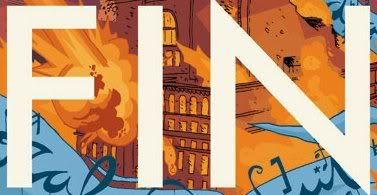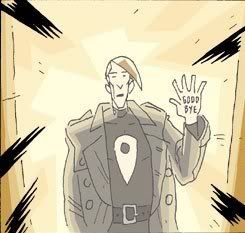I'm going to avoid jokes about things working in concert: Jog was robbed of his puns on 2/20
/![]() The Umbrella Academy: Apocalypse Suite #6 (of 6):
The Umbrella Academy: Apocalypse Suite #6 (of 6):

That's not really true.
This is the last issue of writer/creator Gerald Way's and penciller/inker Gabriel Bá's (and colorist Dave Stewart's and letterer Nate Piekos') initial miniseries featuring these characters - it's even titled Finale (in the short form; there's no fucking way I'm typing out the 30-word full title, The Umbrella Academy, Featuring the Utter Destruction of Mankind in: Finale or, Brothers and Sisters, I Am An Atomic Bomb being Part Six of Six in the Story: Apocalypse Suite). But, in Mignola-approved Dark Horse fashion, we're clearly dealing with an ongoing series set up as a set of miniseries to offset the perception of delay in between storylines. And, in proper modern superhero fashion, the first storyline mainly serves to establish the extended premise and get all the main players in place for later action.
I liked this storyline, although I think its freshness has been slightly overestimated. When you really go through this comic, there's little that's original, or even particularly odd about it. You've got your fragmented 'family' of angsty superheroes -- a stolid leader, a hothead, an oddball (relatively speaking), a reluctant one with massive power, a badass with dark secrets -- pulled together by fate, a disgruntled teammate made extra-powerful but uncaring by a scheming supervillain, a global threat, some soap opera sexual tension, a supporting character's death to raise the stakes, and, finally, members of the team coming together against the odds through an uneasy mix of love and hate, some of them discovering they're greater than they'd ever realized, so as to save the day and opt to stick together for further exploits as hopeful rays of sunshine beam down to mark a fresh day. There's even a joke where someone says things aren't going like they usually do in these kinds of stories ("Is this the part where we all go home and act like a happy family?"), as often happens in stories like this!
Now, I don't think there's much inherently wrong with that, other than the lingering sense that you've read it somewhere before. The Umbrella Academy does have a lot going for it in superhero aesthetics; all of the visual elements join seamlessly, with this particular issue boasting a nice use of musical notation as a suffocating, near-magical force, something that's just not going to work if everything isn't lined up skillfully, and here it is. Better still, there's a good, complimentary balance between text and images; I liked how the image of the Televator bookends the really heavy parts of this issue's climactic fight, kind of starting and stopping the bloodiest bits like a bell in a boxing match.
There's also a certain subtext running through the series - all of the book's superheroes are without control of their lives, raised to act at the beck and call of a creator that built them into something mighty without having their best interests at heart. All of the threats they face in the present are aftershocks of old adventures, with the emotional ruin of the turncoat teammate being the worst problem of all. It's not hard to read this as anxiety of genre history, the way superheroes get brought back again and again to face often the same old threats, managed to profit but damaged in the process.
The thing is, while this storyline ends on a cute (and unequivocally triumphant) note of the past coming full circle so that everyone can move on, I don't think the book has demonstrated that anything has really changed, aside from superheroes changing a little so as to keep the adventures flowing. Like, they learn something about compassion -- or are some of them still mad?! -- and I guess they're out to live on their own terms now, but I see that as part of some pretty typical genre mechanics, and while the book is neat enough that I'm happy to read it, I don't pick up on anything all that striking. It's nice, and pretty eloquent, but I don't think it's especially interesting.
Still, you know, it's fun. The writerly decoration is peppy, there's some good jokes, and a nice grasp of archetypical characters with colorful powers. As I've said before, if more medium-burn superhero books were as slick and entertaining as this, I'd be picking up a lot more of them. GOOD stopping point, GOOD series so far. Way has an obvious talent for this thing, and I'm totally on board to see where the series goes next; I hope it develops in strange and fantastic ways.












